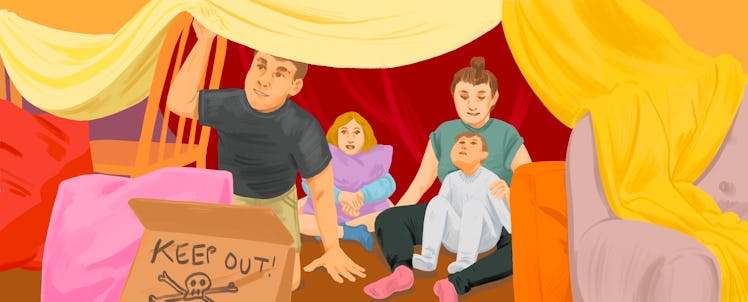Dear Coronavirus Quarantined Parents, You Now Have Just One Job
In a sense, the pandemic has been clarifying. All the activities and obligations we thought constituted the act of parenting were ultimately a sideshow.

When my wife and I went into coronavirus lockdown, putting our family of four on war-footing, we took a regimented approach. We had two battle plans in the form of schedules for our 1st and 3rd-grade boys. There were enough classes and activities to keep the rank and file in line while the higher ranking members managed full-time jobs and the logistics of a campaign of Zoom playdates.
Five days later, my wife was stress vomiting and I was screaming into a pillow.
We’d misunderstood the nature of the conflict. We’d assumed that a frontal assault followed by a transitional government would bring peace (in the form of quasi-normalcy) to the region. But that’s not how these things go. Diseases cannot be overthrown. No quarantine cannot be intimidated into submission. In attempting to win a war, we’d lost a series of battles. Screen time was all the time. Indoor voices had been cranked up to 11. There were drawings on the wall. Then my wife got sick and our home became a failed state.
As we were forced by necessity and infection to give up on our militant approach, we reconsidered the landscape. We looked at our kids — scared, exposed, resilient — and agreed that we had just one job going forward. It’s the job all parents now have and the fullest of full-time employment: Make sure children feel safe and loved. Everything else is optional.
Parenting in America prior to coronavirus was (at least for the middle and upper-middle classes) a competitive activity defined by intensive strategies — all that helicoptering and overscheduling and extracurricular-ing in service of an ill-defined economic or social end. Many of us came to believe that overscheduling, over-worrying, and, frankly, over-investing in children constituted the act of parenting. Not so. Keeping up is about what happens outside the circle. Parenting is what happens inside the circle. (The circle, if you’re struggling to follow, is nuclear family.)
Expectations become obligations become norms. In a crisis, norms become a liability.
Isolation and intensive parenting are an awful combination, one that guarantees stress in the home. When the stakes get high, tempers follow. But here’s the thing: Whereas coronavirus is serious — believe me, I’ve had it — what my kids do during the Covid-19 lockdown really isn’t. Conflating the high stakes of the historical moment with the low stakes of potential boredom or annoyance invites instability and toxicity to the dinner table.
It’s my job to know that children who grow up with every advantage, but live with parents who are unresponsive, uncaring or suffering mental health issues often end up struggling more in adulthood than children who grow up in poverty or in conflict zones with parents that model stability and provide love. How kids cope is tied to genetics, but roughly a third the product of their caregivers’ behavior. That twin study-derived number is a lot more significant than the correlation of a first graders math homework with his or her future happiness.
A 2014 study from the University of Mary Washington that examined the intensive parenting behaviors of 241 parents and the outcomes of their children found that most expensive and time-intensive activities did not meaningfully alter development outcomes, language development or, for that matter, happiness. That sort of parenting reflected adults’ anxiety not childs’ need. Which is not to say that parental involvement isn’t helpful, but rather that involvement doesn’t need to be goal-oriented.
Playing with LEGOs is involvement. Apologizing for having to take a work call is involvement. Coming home at the end of the day and distributing hugs is involvement. These aren’t solutions to the problem of how to keep children occupied, but that’s not an existential issue. The stakes are — at least educationally and developmentally speaking — quite low. Nothing to stress vomit over.
Right now, parents need to focus on the core act of parenting, providing security and love. There are very simple ways to do that. One way is to make sure that time spent together is focused on play and joy. The other way is to talk. Ask questions. Listen. Address the concerns that children have, not the ones that you think you’re supposed to have. Be honest. Help. That’s the gig.
The post-pandemic future is unknowable to some degree, but there are certain things we can be far more certain about than the economy. We can know for damn sure that we’ll still be there for our kids and we can know for damn sure what they’ll need us for: security and love. Just that. Always that.
This article was originally published on